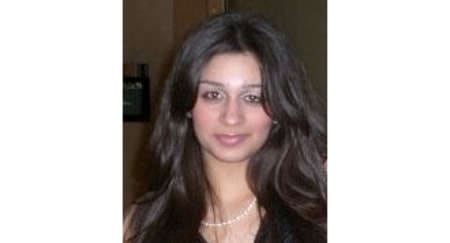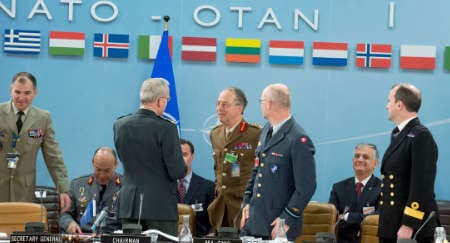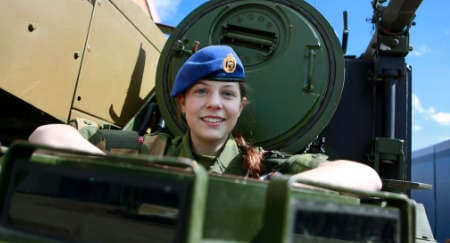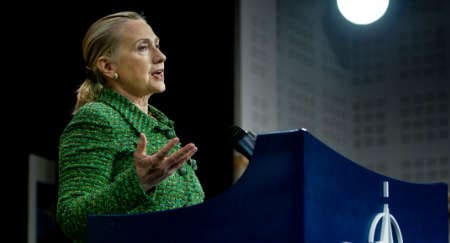What's it like to be a young woman rising up the ranks of the security world? We asked Ioanna Zyga, who has worked at both NATO headquarters and the European Parliament about her experiences - and whether she sees it as still a male-dominated world.
I come from a family in which women served in the military and homeland security. As a young professional, I have worked in the security field for the past four years. I know how the sector works and am no angry feminist. But even so, I am struck by the global lack of women in security, particularly in top security policy positions.
True, an effort to integrate women in the security area has been made. And more women are now entering what was traditionally perceived to be a male-dominated field. But much remains to be done.
Consider for example women in a mostly male institution, the military. The military seems to be one institution where the “glass ceiling” is very visibly apparent and women are vastly outnumbered by men. While I worked at NATO HQ, or at the European Parliament, generals would regularly come to brief on security related topics. I have not met one who was female.
One reason for this is the limits on women in combat. For physical and cultural reasons, there is a mixed record on opening up front-line positions to women. On the plus side, Scandinavian countries are pioneers in advancing women’s leadership in the military. Norway, in particular, became the first country to allow women to serve on its military submarines in 1995. In the US, the Pentagon has just lifted its combat ban on women. However, many other countries continue to ban women from combat tasks.
In security policy, more women are choosing this path as a career. However, women are still underrepresented at the top. I have attended countless meetings and conferences around the world where women around the table discussing critical security issues were few - if any. Oftentimes at these meetings, as a young female - who according to prevailing stereotypes could not possibly be interested in topics such as disarmament and missile defence - I was mistaken for the interpreter.
Even at NATO, where I interned with the International Military Staff rather with the civilian side of the Alliance, people kept asking me why I had chosen this path; apparently, the fact that a female civilian decided to work with the military was “not normal.”
These examples serve to illustrate that security is traditionally perceived to be a man's world in which masculine leadership is correlated with success. For many, being a female is a drawback in itself. It is very unfortunate that these stereotypes can impact on women's career aspirations and choices. To commit to a certain career path, you have to believe that you can achieve success in it.
Additionally, the security field is less attractive to the many women who need to find the right life-work balance. High-level security positions usually require extensive travelling and working long hours. Social norms often anticipate women prioritising family over career. It is completely acceptable for a woman to be a stay-at-home mum while her husband is working. But how many men are willing to sacrifice their careers while their spouses serve in the upper echelons of government or the military?
Mentorship is also crucial for the advancement of women in top security positions. My experience is that senior men in the area are more comfortable advising younger males which better fit the profile of a future successful policy maker. They tend to promote each other. However, younger females also need senior women to serve not only as mentors and role models but in addition as promoters for their advancement. Unfortunately, there are only a limited number of women serving in top security positions that can do this. Luckily, some progress in this area is seen and senior males seem to be more willing to advise and mentor females in the field.
There is extensive literature on the qualities and added value females bring to the table when it comes to security issues. Women such as Madeleine Albright, Hillary Clinton, Condoleezza Rice and Claude-France Arnould all managed to break through traditional barriers. They are living proof that female power is totally different from masculine power - but also that women can be as tough, as professional, and as effective as males.
Initiatives like the United Nations Security Council Resolution 1325 (UNSCR 1325) are instrumental in promoting women’s leadership. The resolution, which was unanimously passed by the Security Council in 2000, reaffirms women’s right to equal participation in peace and security and calls for increased representation of women at all levels of decision-making.
UNSCR 1325 has certainly made a difference in creating opportunities for women in leadership positions and, indeed, today many organisations apply gender sensitive recruiting processes. This is the case at the European Parliament, and very recently we found out that the new Head of the Secretariat of the Subcommittee on Security and Defence will be a female - a position which has been held by a male for almost a decade. It has to be noted, though, that there are challenges in the implementation of UNSC1325 - the fact that recruitment policies will be gender-based does not necessarily mean that women will apply for these positions.
Going up the security ladder is hard for females who encounter many more barriers to rising up it than can be discussed in this article. No matter how much of a cliché it may sound, commitment, ambition and hard work are the main ingredients for success.
A former Pentagon staffer once told me that the road to Defence Minister (or to any position of great responsibility, I would add) has lots of unexpected twists and turns. But any prize worth having is worth the extra hours and hardships it may take to obtain it. And isn’t the best prize in life the opportunity to work hard at a work worth doing? Women may face extra hurdles in the security world, but we have proven that we can contribute in amazing ways and we must continue to dream big and fight for our place at the table.





